- Home
- Josephine Tey
Brat Farrar Page 14
Brat Farrar Read online
Page 14
She turned to Brat to say good night, became suddenly shy, gave him her hand and said: "Good night then, Brat. Sleep well," and went away upstairs.
Brat turned to Bee, but she said: "I shall come in to see you on my way up." So he turned back to face Simon.
"Good night, Simon." He met the clear cold eyes levelly.
"Good night to you-Patrick," Simon said, looking faintly amused. He had managed to make the name sound like a provocation.
"Are you coming up now?" Brat heard Bee ask him as he climbed the stairs.
"Not quite yet."
"Will you see that the lights are out, then? And make sure of the locks?"
"Yes, of course I'll do that. Good night, Bee darling."
As Brat turned on to the landing he saw Bee's arms go round Simon. And he was stabbed by a hot despairing jealousy that shocked him. What had it to do with him?
Bee followed him into the old night nursery in a few moments. She looked with a practised eye at the bed and said: "That moron promised to put in a hot-water bottle and she has forgotten to do it."
"Don't worry," Brat said. "I'd only have put it out again. I don't use the things."
"You must think us a crowd of soft-livers," she said.
"I think you're a nice crowd," he said.
She looked at him and smiled.
"Tired?"
"Yes."
"Too tired for breakfast at eight-thirty?"
"That sounds luxuriously late to me."
"Did you enjoy it, that hard life-Brat?"
"Sure."
"I think you're nice too," she said, and kissed him lightly. "I wish you hadn't stayed away from us so long, but we are glad to have you back. Good night, my dear." And as she went out: "It's no use ringing a bell, of course, because no one will answer. But if you have a mad desire for fried shrimps, or iced water, or a copy of the Pilgrim's Progress or something, come along to my room. It is still the right-hand one in front."
"Good night," he said.
She stood for a moment outside his room, the door-knob still in her hand, and then moved away to Eleanor's door. She knocked and went in. For the last year or so Eleanor had been a great comfort to her. She had been so long alone in her need for judgment and resolution that it was refreshing to have the companionship of her own kind; to have Eleanor's unemotional good sense on tap when she wanted it.
"Hullo, Bee," Eleanor said, looking up through the hair she was brushing. She was beginning to drop the "aunt," as Simon did.
Bee sank into a chair and said: "Well, that's over."
"It turned out to be quite a success, didn't it," Eleanor said. "Simon behaved beautifully. Poor Simon."
"Yes. Poor Simon."
"Perhaps Brat-Patrick-will offer him some kind of partnership. Do you think? After all, Simon helped to make the stable. It wouldn't be fair to walk in and grab the lot after taking no interest for years and years."
"No. I don't know. I hope so."
"You sound tired."
"Aren't we all?"
"D'you know, Bee, I must confess I have the greatest difficulty in connecting the two."
"The two? Simon and Patrick?"
"No. Patrick and Brat."
There was a moment's silence, filled with the soft sound of the rain and the strokes of Eleanor's brush.
"You mean you-don't think he is Patrick?"
Eleanor stopped brushing and looked up, her eyes wide with surprise. "Of course he's Patrick," she said, astonished. "Who else would he be?" She put down the brush and began to tie up her hair in a blue ribbon. "It's just that I have no feeling of ever having met him before. Odd, isn't it? When we spent nearly twelve years of our lives together. I like him; don't you?"
"Yes," Bee said. "I like him." She, too, had no feeling of ever having met him before, and she too did not see "who else he could be."
"Did Patrick not smile very often?"
"No; he was a serious child."
"When Brat smiles I want to cry."
"Good heavens, Eleanor."
"You can 'good heavens' all you like, but I expect you know what I mean."
Bee thought that she did.
"Did he tell you why he didn't write to us all those years?"
"No. There wasn't much opportunity for confidences."
"I thought you might have asked him when you were going round the paddocks with him this evening."
"No. He was too interested in the horses."
"Why do you think he didn't take any interest in us after he left?"
"Perhaps he took what old Nannie used to call a 'scunner' to us. It's not so surprising, in a way, as the fact that he ran away in the first place. The urge to put Latchetts behind him must have been overwhelming."
"Yes. I suppose so. But he was such a kind person: Pat. And so fond of us all. He mightn't have wanted to come back, but you would have thought he'd want to let us know that he was safe."
Since this was her own private stumbling-block, Bee had no help to offer.
"It must have been difficult to come back," Eleanor said, running the comb through her brush. "He looked so tired to-night that he looked like a dead man. It's not a very lively face at the best of times, is it? If you chopped it off behind the ears and hung it on a wall, no one would know the difference."
Bee knew Eleanor well enough, and agreed with her sufficiently, to translate this successfully.
"You don't think he'll want to sheer off again once the excitement of coming home has worn off?"
"Oh, no, I'm quite sure he won't."
"You think he is here for keeps?"
"Of course I do."
But Brat, standing in the dark before the open window of his room and looking at the curve of the down in the wet starlight, was wondering about that very matter. The thing had succeeded beyond Loding's most extravagant promises, and now?
Where did he go from here? How long would it be before Simon had him cold? And if Simon failed, how long could he go on living a life where at any moment someone might spring a mine?
That is what he had set out to do, of course. But somehow he had not really looked beyond the first stages. In his heart he had been unable to believe that he would succeed. Now that success was his he felt rather like someone who has climbed a pinnacle and can't get down again. Elated but misgiving.
He turned from the window and switched the lamp on. His landlady in Pimlico used to say that she "was so tired that she felt as if she'd been through a mangle"; he knew now how good a description that had been. That was exactly how he felt. Wrung out and empty. So limp that it was an effort to lift a hand to undress. He pulled off his nice new suit-the suit that had made him feel so guilty in that other life way back in London-and made himself hang it up. He peeled off his underclothes and stumbled into his faded old pyjamas. He wondered for a moment whether they would mind if the rain came in and marked the carpet, but decided to risk it. So he left the window wide open and got into bed.
He lay for a long time listening to the quiet sound of the rain and looking at the room. Now was the time for Pat Ashby's ghost to come and chill that room. He waited for the ghost but it did not come. The room was warm and welcoming. The figures on the wallpaper, the figures that those children had grown up with, looked friendly and alive. He turned his head to look at the groups by the bedside. To look for the one Eleanor had been in love with. The chap with the profile. He wondered if she was in love with anyone now.
His eyes went on to the wood of the bedstead, and he remembered that this was Alec Loding's bed, and was pleased once more by the irony of it all. It was fantastically right that he should come to Latchetts only to sleep in Alec Loding's bed. He must tell him one day. It was the kind of thing that Loding would appreciate.
He wondered whether it was Eleanor or Bee who had put the flowers in the bowl. Flowers to welcome him-home.
Latchetts, he said to himself, looking at the room. This is Latchetts. I'm here. This is Latchetts.
The sound of the wo
rd was a soporific; like the swing of a hammock. He put out his hand and switched off the light. In the dark the rain suddenly sounded louder.
This morning he had got up and dressed in that back room under the slates, with the crowding chimney-pots beyond the window. And here he was, going to sleep in Latchetts, with the sweet cold smell of the down blowing in on the damp air from the window.
As sleep drew him under he had an odd feeling of reassurance. A feeling that Pat Ashby didn't mind his being there; that he was on the contrary pleased about it all.
The unlikeliness of this roused him a little, and his thoughts, running on approval and disapproval, went to Bee. What was it that he had felt when Bee took his hand to lead him to the interview this afternoon? What was different from any other of the thousand handclasps he had experienced in his time? Why the surge of warmth under his heart, and what kind of emotion was it anyway? He had suffered the same obscure gratification when Bee had thrust her arm through his on the way to the stables. What was so remarkable about a woman putting her hand on your arm? A woman, moreover, that you were not in love with, and were never likely to be in love with.
It was because she was a woman, of course, but the thing that made it remarkable was something else again. It had something to do with being taken for granted by her. No one else had taken his hand in just that way. Casual but-no, not possessive. Quite a few had been possessive with him, and he had not been gratified in the least. Casual but-what? Belonging. It had something to do with belonging. The hand had taken him for granted because he belonged. It was the unthinking friendliness of a woman to one of her family. Was it because he had never «belonged» before, that made that commonplace gesture into a benediction?
He went on thinking of Bee as he fell asleep. Her sidelong glance when she was considering something; her courage; the way she had braced herself to meet him that day in the back room in Pimlico; the way she had kissed him before she was sure, just in case he was Patrick; the way she had dealt with the suspense of Simon's absence when he arrived to-day.
She was a lovely woman, Beatrice Ashby, and he loved her.
He had reached the toppling-over place of sleep when he was yanked of a sudden wide awake.
He had remembered something.
He knew now who it was that Simon Ashby reminded him of.
It was Timber.
17
On Wednesday morning Bee took him to call on the tenants of the three farms: Frenchland, Upacres, and Wigsell. "Gates last; just to larn him," Bee said. Gates was last also in importance, since Wigsell was the smallest of the three farms. It had originally been the home farm of Latchetts and lay just beyond the Rectory, on the slope north of the village. It was almost too small a farm to be self-supporting, but Gates also ran the butcher's shop in the village (open twice a week) and was not dependent on what he made from Wigsell.
"Do you drive, Brat?" Bee asked, as they prepared to get into the car.
"Yes, but I'd rather you did. You know the"-"road" he had almost said-"the car better."
"Nice of you to call it a car. I expect you're used to a left-hand drive."
"Yes."
"I'm sorry it had to be the bug. It isn't often the car goes wrong on us. Jameson has all its inside out on the garage floor, and is conducting a post-mortem in a silent fury."
"I like the bug. I came from the station in it yesterday."
"So you did. What a very long time ago that seems. Does it seem like that to you?"
"Yes." It seemed years away to him.
"Have you heard that we've been saved from the Clarion?" she asked, as they sped down the avenue to the accompaniment of the bug's sewing-machine song.
"No?"
"Are you not a consumer of the Press at breakfast?" asked Bee, who had breakfasted at eight o'clock.
"I never lived where we had papers to read at breakfast. We just switched on the radio."
"Oh, lord, yes. I forget that your generation doesn't have to read."
"How have we been saved?"
"We have been rescued by three people we never heard of, and are never likely to meet. The fourth wife of a Manchester dentist, the husband of a principal boy, and the owner of a black leather trunk." She pressed the horn and turned slowly to the right out of the avenue. "The owner of the trunk left it at Charing Cross with someone's arms and legs in it. Or, of course, it may be the owner's arms and legs. That is a question which will occupy the Clarion for some time to come, I expect. The husband of the principal boy is suing for alienation of affection, and none of the three people concerned has ever been bothered with an inhibition, which is very nice for the Clarion. Since the reports of divorce cases have been pruned the Clarion has been suffering from frustration, and a suit for alienation of affection is a gift from heaven. Especially when it is Tattie Thacker's affections." She looked with pleasure at the morning. "I do like a morning after rain."
"You've still one to come?"
"What?"
"The fourth wife of the Manchester dentist."
"Oh. Yes. She, poor wretch, has just been exhumed from a very expensive and elaborate tomb and found to be loaded with arsenic. Her husband is found to be missing."
"And you think that the Clarion will be too busy to bother about-us?"
"I'm sure of it. They haven't room as it is for all they want to do with Tattie. She had a whole page to herself this morning. If they ever bothered about the Ashbys they would print the report in a tiny paragraph at the bottom of a page, and five million people would read it and not be able to tell you two minutes later what was in it. I think we are quite safe. The Westover Times will have one of their usual discreet paragraphs this morning, and that will be the end of the matter."
Well, that was another snag out of the way. In the meantime he must keep his wits alive for the visits to Frenchland and Upacres. He was supposed to know these people.
Frenchland was farmed by a tall rosy old man and his tall sallow sister. "Everyone was terrified of Miss Hassell," Loding had said. "She had a face like a witch, and a tongue that took the skin off you. She didn't talk; just made one remark and you found that you were raw."
"Well, this is an honour," old Mr. Hassell said, coming to the garden gate and seeing whom Bee had with her. "Mr. Patrick, I'm glad to see you. I'm tarnation glad to see you." He took Brat's hand in his gnarled old fist and closed on it with his other one. There was no doubt that he was glad to see Patrick Ashby again.
It was difficult to know whether Miss Hassell was glad or not. She eyed Brat while she shook hands with him and said: "This is an unexpected pleasure." Her dry use of the conventional phrase and its wicked appropriateness amused Brat.
"Foreign parts don't seem to have changed you much," she said, as she set out glasses in the crowded little parlour.
"I've changed in one way," Brat said.
"You have?" She wasn't going to gratify him by asking in what way.
"I'm not frightened of you any more."
Old Mr. Hassell laughed.
"You beat me there, son. She still puts the fear of God in me. If I'm half an hour late getting home from market I creep up the lane with my tail down like I was a sheep-stealer."
Miss Hassell said nothing, but Brat thought there was a new interest in her glance; almost as if she were pleased with him. And she went away and fetched some shortbread from the kitchen which she had obviously had no intention of producing before.
They drank a liquid called White Port Wine Type, and discussed Rhode Island Reds.
At Upacres there was only plump Mrs. Docket, and she was busy making butter in the dairy at the back.
"Come in, whoever you are!" she called, and they went down the cool tiled passage from the open front door, and turned into the chill of the dairy.
"I can't stop this," she said, looking round at them. "The butter is just — Oh, goodness, I didn't know! I just thought it was someone passing. The children are all at school and Carrie is out in the barn and — Goodness! To think o
f it!"
Bee automatically took her place at the churn while she shook hands with Brat.
"Well, well," said kind plump Mrs. Docket, "a fine, good-looking Ashby you are. You're more like Mr. Simon than ever you were."
Brat thought that Bee looked up with interest when she said that.
"It's a happy day for us all, Miss Ashby, isn't it? I could hardly believe it. I just said to Joe, I don't believe it, I said. It's the kind of thing that happens in books. And in pictures and plays. Not the kind of thing that would happen to quiet folk like us in a quiet place like Clare, I said. And yet here you are and it's really happened. My, Mr. Patrick, it's nice to see you again, and looking so well and bonny."
"Can I have a shot at that?" Brat asked, indicating the churn. "I've never handled one of those things."
"But of course you have!" Mrs. Docket said, looking taken aback. "You used to come in special on Saturday mornings to have a go at it."
Brat's heart missed a beat. "Did I?" he said. "I've forgotten that."
Always say quite frankly that you don't remember, Loding had advised. No one can deny that you don't remember, but they will certainly jump on you if you try to make-believe about anything.
"I thought you did this by electricity now," he heard Bee say as she made way for him at the churn.
"Oh, we do everything else by electricity, of course," Mrs. Docket said. "But I can't believe it makes good butter. No more home-made taste to it than you'd get at the International in Westover. Sometimes when I'm rushed I switch on the electricity, but I'm always sorry afterwards. Awful mechanical, it is. No artfulness about it."
They drank hot black tea and ate light floury scones and discussed the children's schooling.
"She's a darling, Mrs. Docket," Bee said as they drove away. "I think she is still of the opinion in her heart of hearts that electricity is an invention of the devil."
But Brat was thoughtful. He must stop himself from volunteering remarks. It was not important about the churn, but it quite easily might have been something vital. He must be less forthcoming.
"About Friday, Brat," Bee said, as they made their way back to Clare and to Wigsell.
"What is on Friday?" said Brat, out of his absorption.

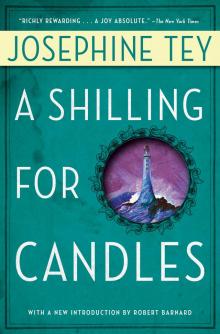 A Shilling for Candles
A Shilling for Candles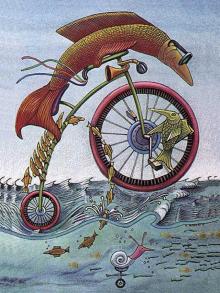 The Singing Sands
The Singing Sands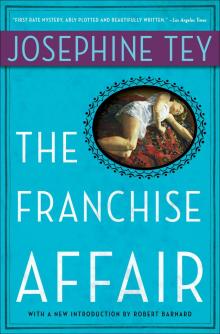 The Franchise Affair
The Franchise Affair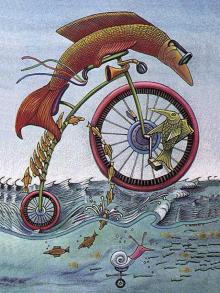 Daughter of Time
Daughter of Time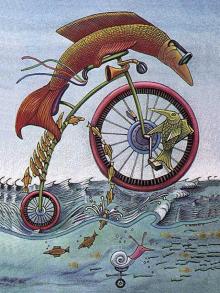 To Love and Be Wise
To Love and Be Wise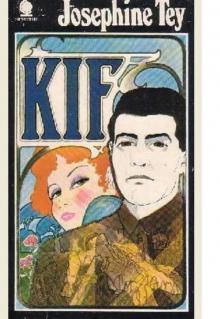 Kif
Kif The Expensive Halo: A Fable Without Moral
The Expensive Halo: A Fable Without Moral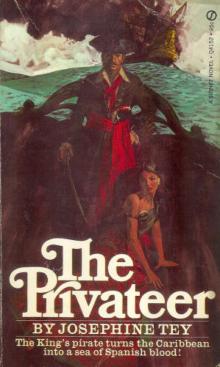 The Privateer
The Privateer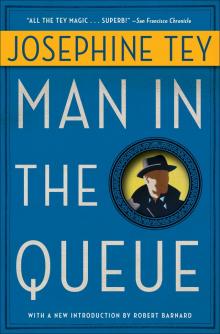 The Man in the Queue
The Man in the Queue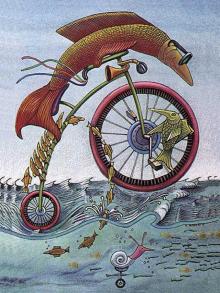 Miss Pym Disposes
Miss Pym Disposes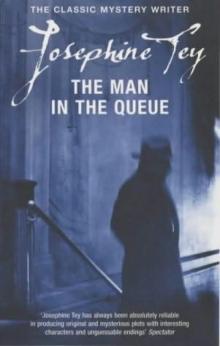 The Man in the Queue ag-1
The Man in the Queue ag-1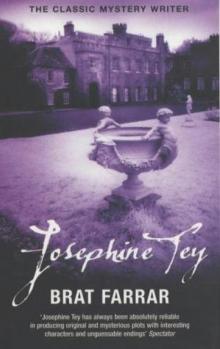 Brat Farrar
Brat Farrar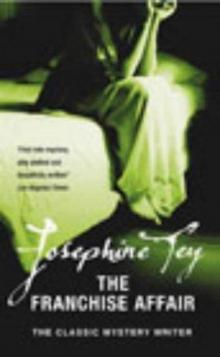 The Franchise Affair ag-3
The Franchise Affair ag-3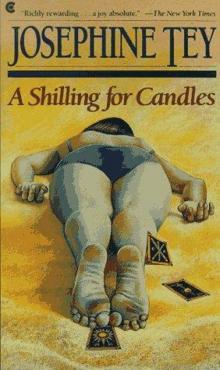 A Shilling for Candles ag-2
A Shilling for Candles ag-2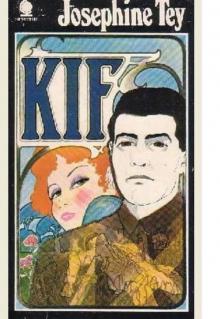 Kif: An Unvarnished History
Kif: An Unvarnished History The Expensive Halo
The Expensive Halo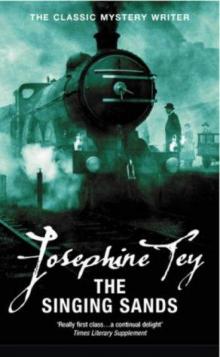 The Singing Sands ag-6
The Singing Sands ag-6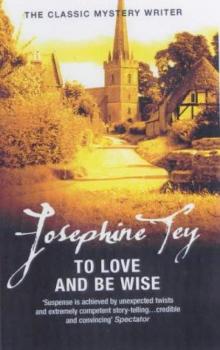 To Love and Be Wise ag-4
To Love and Be Wise ag-4